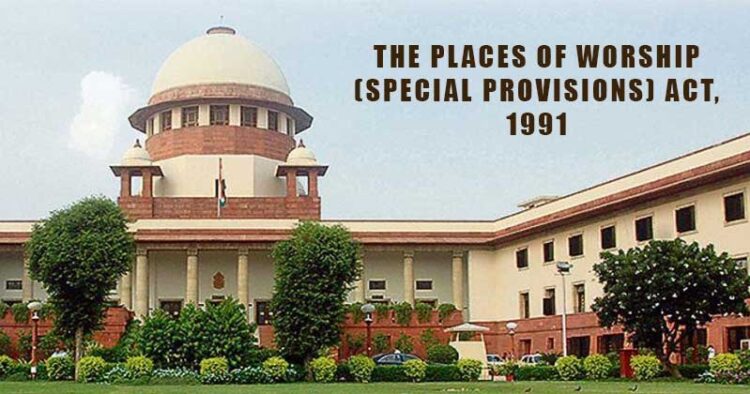The Apex Court has extended the timeline for the Central Government to file its counter-affidavit in a batch of petitions challenging the Places of Worship (Special Provisions) Act 1991, which prohibits conversion of any place of worship and provides for maintenance of the religious character of any place of worship as it existed on the date of independence. The Court has given the Government time till the end of February 2023 to file its affidavit. The key matter in which the Kerala Government has now filed this Intervention Application will be taken up for hearing by the Apex Court on 11 January, 2023.
A bench presided over by Chief Justice DY Chandrachud and Justice PS Narasimha enquired on 9th January if the Union of India had filed counter in the matter. To this, Solicitor General of India Tushar Mehta requested the bench to fix a date so that the counter could be filed. Further, the bench specified that it would list the matter on a non-miscellaneous day.
A total of six petitions against the Act have been listed by a bench. Senior Advocate Kapil Sibal is appearing for All India Muslim Personal Law Board (AIMPLB), Senior Advocate Rakesh Dwivedi for BJP leader and advocate Ashwini Upadhyaya, and Senior Advocate Vrinda Grover for Jamia Ulama-i-Hind. The Apex Court was hearing the petitions, including one filed by advocate Ashwini Upadhyay, who requested certain provisions of the Places of Worship (Special Provisions) Act, 1991 (namely, Sections 2, 3 and 4) be struck down on the premise that they refuse any person or religious group the right to seek judicial redressal to regain a place of worship. Advocate Rakesh Dwivedi reinforced that the challenge has been made to the statute and not against any observations or dictum made by the Apex court in the judgement.
Previously, the Apex Court had requested the Centre’s response to Ashwini Upadhyay’s petition challenging the legal validity of specific provisions of the statute that maintain the existing status on the ownership and character of sacred places as it existed on August 15, 1947. The petition highlighted that the 1991 Act lays down an “arbitrary and irrational retrospective cut-off date” of August 15, 1947, for defending the character of the places of worship or pilgrimage against encroachment done by “fundamentalist-barbaric invaders and law-breakers”.
Senior Advocate Kapil Sibal emphasised that the Apex Court had upheld the said Act in the Ram Janmabhoomi-Babri Masjid Ayodhya judgment and therefore the PILs are not maintainable. He put forward the preliminary objection to the challenge of a legislation through Public Interest Litigation. In his contention, he said “My lords, I have two points. This is in the nature of a public interest litigation and I can understand if there is a dispute concerning structure. This is an act, legislation in terms of which your lordships in Ram janmabhoomi case had made certain observations. My preliminary objection is this that such petitions cannot lie unless it relates to a particular structure. There cannot be a public interest litigation qua judgement of a court taking a certain view. How do you review the judgement of the court? Before you go into the matter, certain issues have to be dealt with.”
The bench acknowledged the objection put forth by Kapil Sibal and said that it will take that into consideration during the final hearing by the end of February.
Senior Advocate Vrinda Grover, further highlighted disputes such as the Gyanvapi mosque and Idgah mosque which according to her argument, are in direct violation of the provisions of the said Act. “In terms of the earlier order, union has placed the position which is not yet on record. We don’t know what the union is saying vis-a-vis this legislation. It is a central legislation. While these petitions are pending, there are disputes such as the Gyanvapi mosque, Idgah mosque – which are in direct breach of this statue. While this is pending, the union has not placed anything before this court. At the same time, litigation of all manner has been taken place. What is happening there is that the religious character is sought to be altered”, she stated.
The previous year in November, SG Tushar Mehta had mentioned that a comprehensive affidavit will be filed by the Central Government concerning numerous attributes of the case and sought some more time to guarantee that the document is filed after due deliberation at several levels of the government.




















Comments